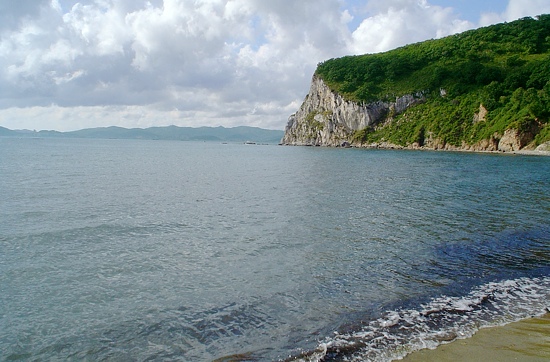Sea of Japan debate places McAuliffe, Virginia in a bind
A bill that reflects a nearly 70-year-old tension between two East Asian countries has pushed the Virginia General Assembly into the middle of an international debate just more than three weeks into session.

By Colin Kennedy | Capital News Service
A bill that reflects a nearly 70-year-old tension between two East Asian countries has pushed the Virginia General Assembly into the middle of an international debate just more than three weeks into session.
House Bill 11 passed the House Education subcommittee last week, bringing the Commonwealth one step closer to requiring its textbooks to note that the Sea of Japan also is known as the East Sea.
The International Hydrological Organization named the body of water, which separates Japan from the Korean peninsula, the Sea of Japan during Japan’s occupation of Korea in the first half of the 20th century.
Now, a substantial Korean-American constituency in Virginia is urging lawmakers to implement a dual name out of courtesy to South Korea’s long-standing sensitivity on the name issue.
The result is a bipartisan effort that includes identical bills from both chambers of the legislature. Senate Bill 2, which was proposed by Sen. Marsden, D-Burke, currently accompanies House Bill 11 in the House of Delegates after the measure passed the Senate 32-4 this past week.
Marsden says he was approached by a number of Korean businessmen about the issue six or seven years ago and originally sponsored similar legislation in 2011.
SB2 and HB11 are nothing more than a symbolic gesture to reflect the controversy, Marsden said, but as the movement inches closer toward legislation, some argue the subtle two-word change could carry larger implications.
Dr. Christopher Burdett, an international relations instructor at Virginia Commonwealth University, says it’s easy for us to overlook the power of such a small change in curriculum.
“This reminds us that maps are not just simply representations of political boundaries or geographic formation,” Burdett said. “Maps are representations of power as well. They are also representations of historical legacies.”
The Embassy of Japan is trying to preserve what it believes to be its historical legacy, fervently contending the issue in the Virginia legislature.
Yamada Yoshiyuki, a public affairs counselor for the Embassy of Japan, says the embassy is following the matter very closely in an effort to defend what Japan deems the only appropriate name for the Sea of Japan.
“Every country sees the name of the ‘Japan Sea’ as common, established and used for a long time,” Yamada said. “The name ‘Japan Sea’ is the only name established in the international community.”
To push its point, the Embassy of Japan has placed significant pressure on the state and Virginia Gov. Terry McAuliffe, who vowed to approve any such proposed legislation during his campaign last year.
Before he was sworn into office, McAuliffe received a letter from Japanese Ambassador Kenichiro Sasae in December reportedly threatening trade relations if the designation was passed. Since McAuliffe’s inauguration, the ambassador has met face-to-face with the governor, and the Embassy of Japan has hired four McGuire Woods lobbyists in an effort to defeat the bills.
South Korean Ambassador Ahn Ho-young visited the capitol this past week to meet with McAuliffe and several lawmakers.
Both embassies have funded research to try and determine the original name, and the two-sided international pressure has wedged McAuliffe into a tough position: if the proposition is passed into law, Virginia risks upsetting its second-largest source of direct foreign investment in Japan. If the measure fails, a significant population in the Commonwealth may become discouraged about the state’s political system.
However, as McAuliffe fights to please some of Virginia’s international partners, it appears that party politics within state boundaries are compounding the problem for the governor.
“It has also given Republicans, who’ve become angry at what they see as the governor’s increasingly combative agenda, a chance to make him sweat a little,” the Washington Post’s Laura Vozzella reported last week. “McAuliffe’s advisers have privately asked lawmakers to kill the legislation, according to four people close to the situation. But the GOP plans to pass the measure and send it to the governor’s desk, forcing him to take a stand.”
McAuliffe reportedly cleared the air by announcing he would sign the bill if it reached his desk. And while Sasae insists such an action would potentially harm relations between the state and Japan, Marsden says he thinks time will heal all wounds.
“Business is business and this will all be forgotten very quickly,” Marsden said.
Marsden also said he thinks SB2 will come out of the House unlike in years past. The legislation likely is to be heard sometime after Feb. 11, according to Marsden’s office, and HB11 currently resides on the House Education docket for the first week of February.
Pass or fail, the collective effort to include reference to the East Sea in Virginia’s textbooks is seemingly stirring up controversy few anticipated.
If approved, the legislation would not impact the commonwealth’s budget, according to Marsden. However, Burdett says the measure could affect the future of the state’s education system and potentially set precedent for more textbook changes down the road.
The passage of such bills could mean Virginia is “weighing in” on an international argument, Burdett says, but the issue may shed light on a larger question in regards to Virginia’s legislature.
“Is this nitpicking or are we shying away from the hard battles?” Burdett asked. “Are there other changes that we should be making that are of greater importance to the commonwealth as a whole?”
Photo by: paukrus
-
Recommend this
on Facebook -

Report an error
-

Subscribe to our
Weekly Digest





There is 1 reader comment. Read it.